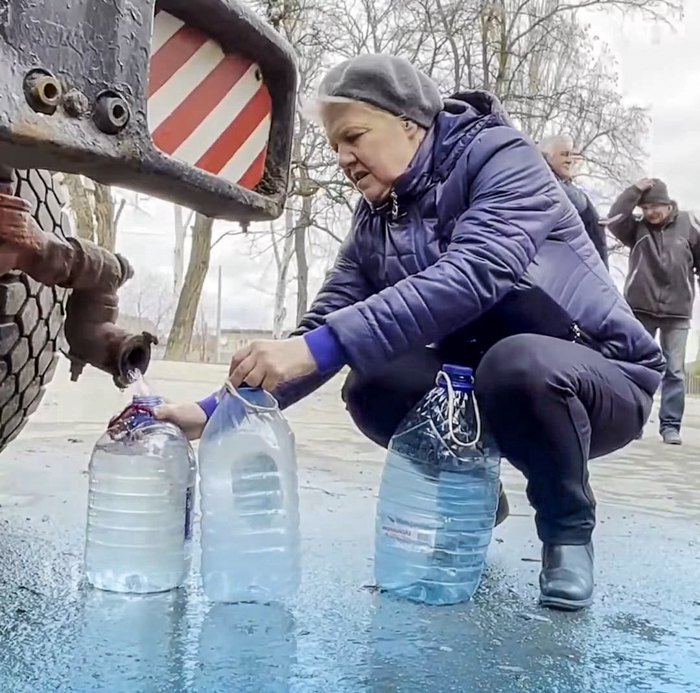
Water every three days
From the first days of the full-scale invasion, due to russian shelling, the first ascent pumping station of the Pivdennyi Donbas water supply system lost power. This station provided water to the citizens of the occupied part of the Donetsk region. Since then, water has been supplied from the additional water reservoir, but the amount of water there is insignificant.
In March, the representatives of the occupation administration in Donetsk reported that the amount of water left was enough only for two weeks supply. At the same time, significant water supply problems began, and the outskirts of Donetsk, Makiivka, Khartsyzsk, and Horlivka have no running water at all. Therefore, from 17 March 2022, water was supplied for two hours twice a day in Donetsk. At the same time, people complained about its quality on social networks and posted photos and videos of the muddy green-brown substance running from their taps.
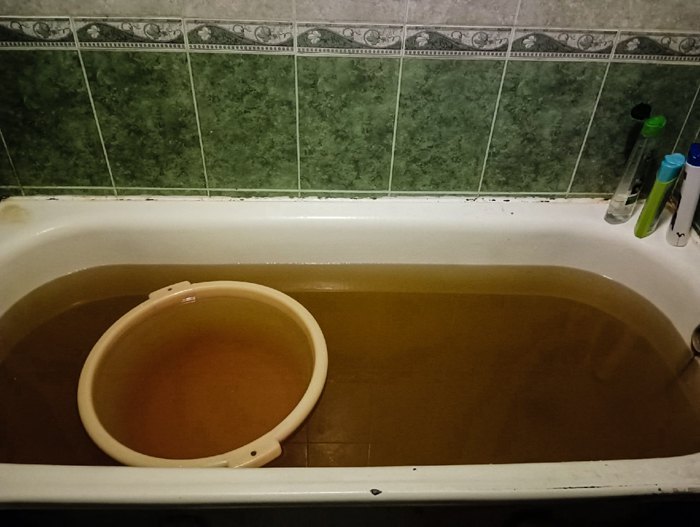
To drain water from pipes and save money, the heating season in the occupied Donetsk region ended on 30 March 2022. Social networks were outraged: the beginning of April was icy.
Since 1 April 2022, the residents of Donetsk, Makiivka, Horlivka, and other cities of CADR (certain areas of the Donetsk region) receive running water only for one hour every three days. Traditionally the occupiers blame the Ukrainian authorities for this. The local groups in the russian social network VKontakte are spreading information that the pumping station near Sloviansk was intentionally closed so that water from the Siverskyi Donets would not get into Donetsk.
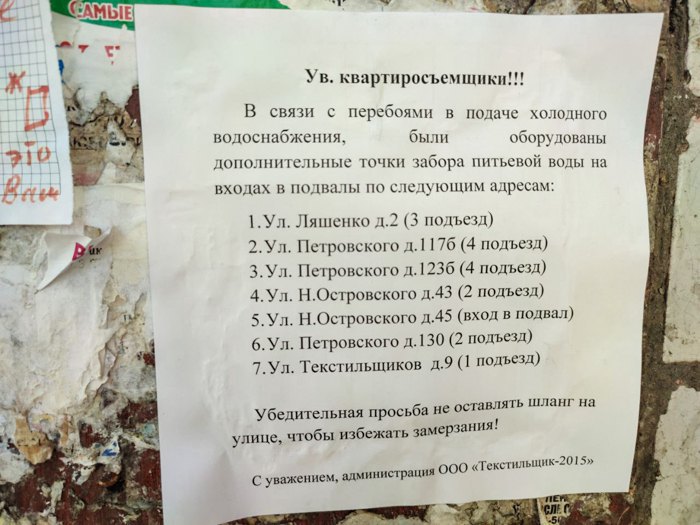
In mid-April, the head of the so-called "DPR" (Donetsk People's Republic), Denys Pushylin, said that restoring the regular water supply in the Donetsk region would be possible only after the russians take control over Sloviansk.
At the same time, the residents of Donetsk write that they have been divided into two groups: while most people have no water, there is no such a problem in the residential buildings of the central part of the city, where the "elite of the republic" lives.
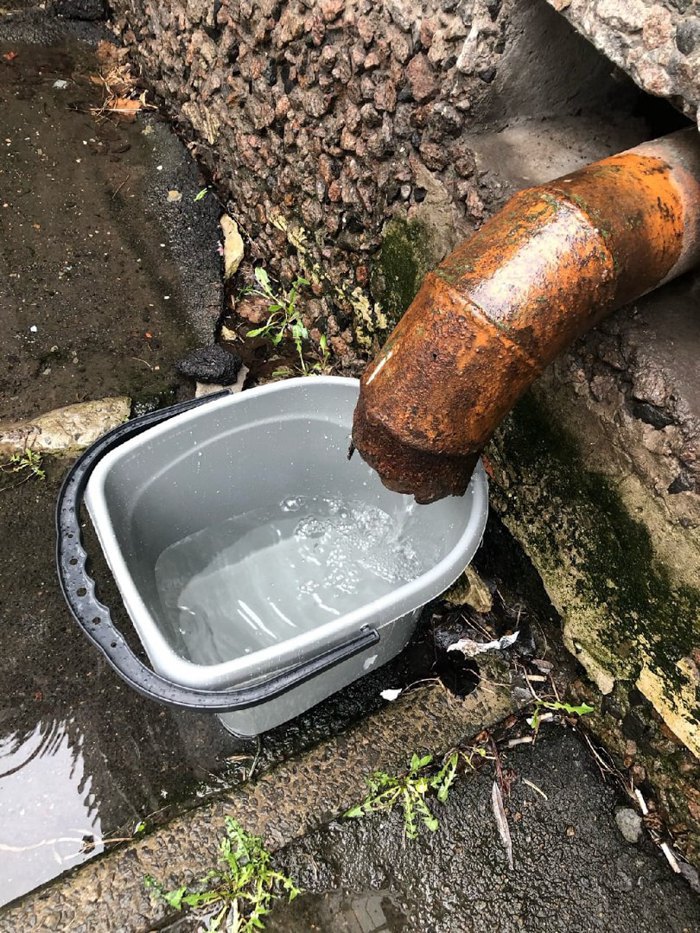
In mid-April, the problems with water increased. Markets and vending machines had the signs saying "no more than 15 liters per person" placed. In addition, the occupational administrations provided schedules of water trucks' work in districts and streets on their websites.
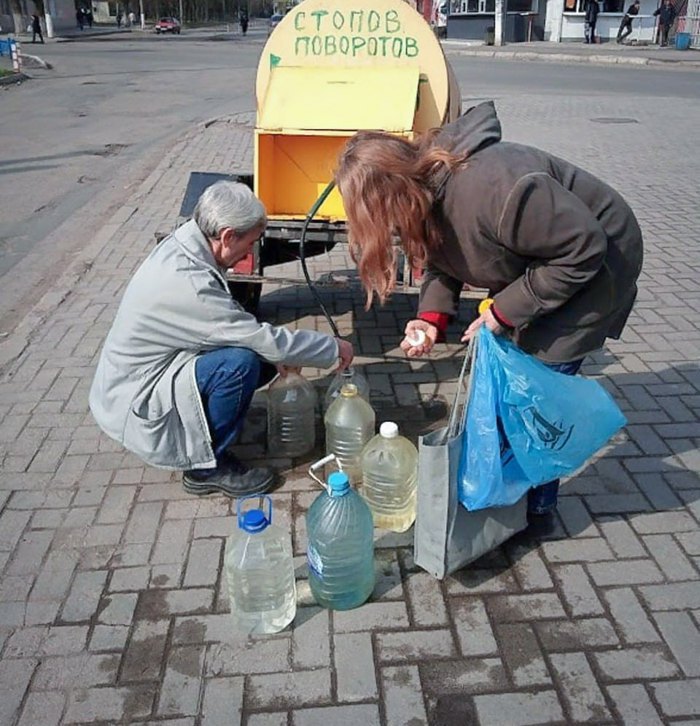
Meanwhile, some lucky people still have water, and they are selling it to neighbors.
Photos of CADRL (certain areas of the Donetsk and Luhansk regions) residents collecting rainwater from the rain gutters using different containers are also spreading on social networks.
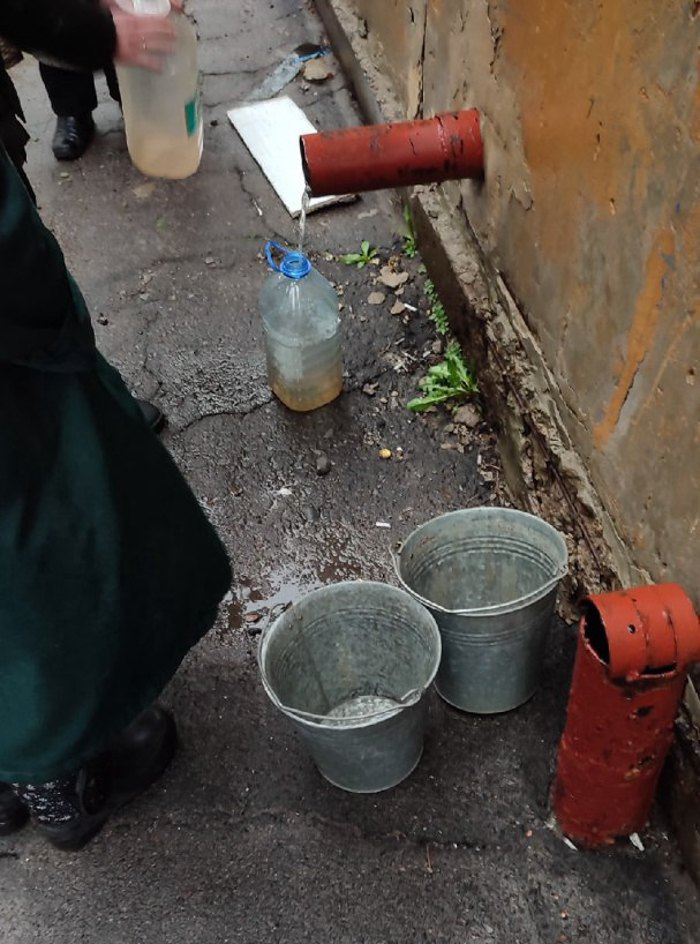
Besides, there are bottles and buckets with taps in apartment buildings that replace traditional sinks, as there is no running water.
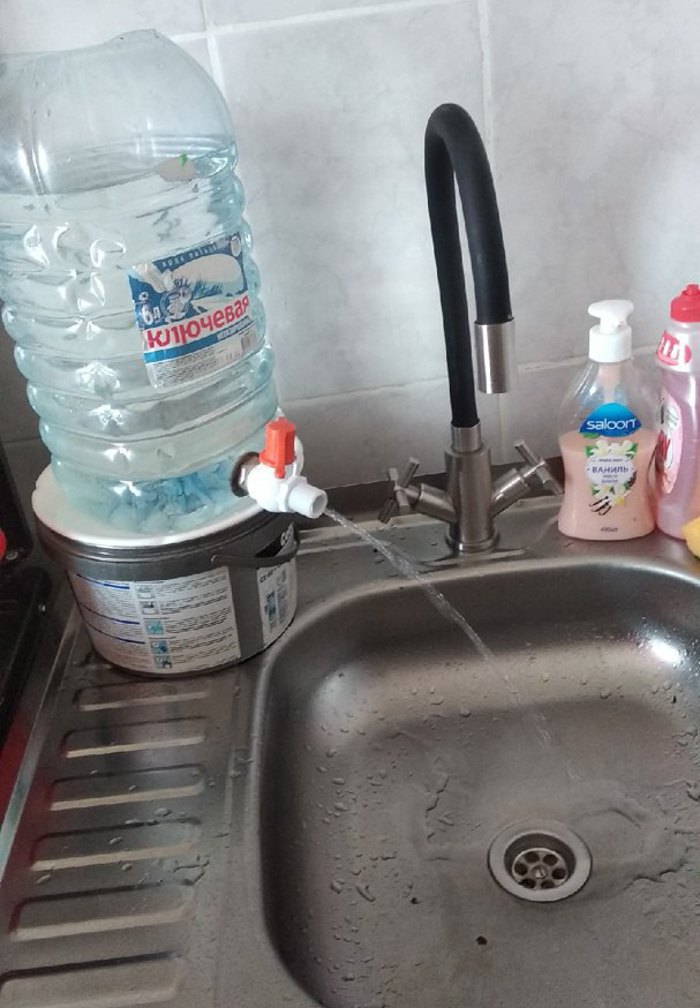
The deficit, increasing prices, and the return of hryvnia
Western sanctions and the withdrawal of global companies from the Russian market have also hit the Kremlin-occupied territories. This is not surprising because there have been no Ukrainian products on the supermarket shelves in Luhansk and Donetsk for a long time.
There was almost no food shortage during the first days of the invasion. Still, at the beginning of March, the shelves of local supermarkets "Moloko" and "Pershyi Respublicanskyi" (former ATB. - LB.ua) got empty. At first, there were plenty of products in the markets and small stores, but they disappeared due to increased purchase prices in Russia.
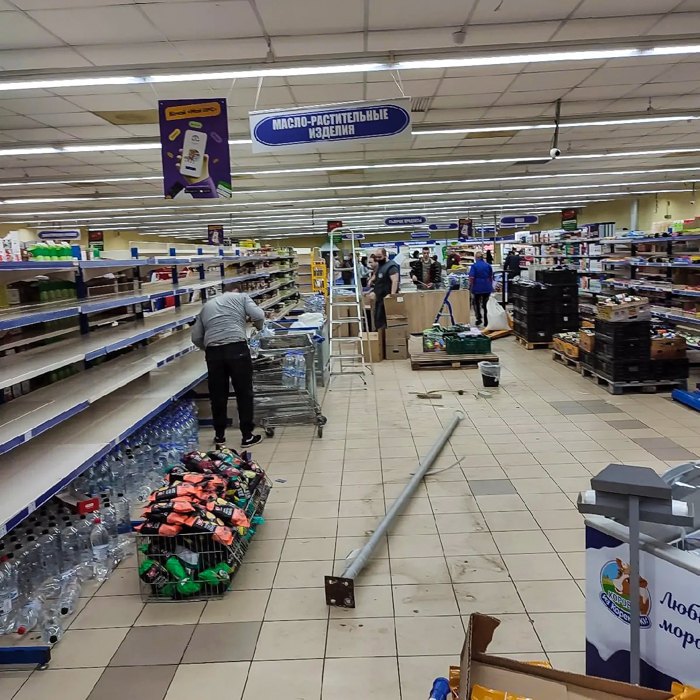
"There are two problems: the lack of some products (sugar, hygiene products, grains, some dairy products) and products prices so high that our people cannot buy them. For example, if 100 grams of butter before the war cost 90-100 rubles (about 35 hryvnias), now the wholesale price alone is 130-150 rubles (about 50 hryvnias). And we still need to add a retail margin so that the store could earn something. "DPR" has nothing of its own except flour," - the owner of a store in occupied Makiivka anonymously told LB.ua.

Russia's "sugar battles" have become a reality in the occupied territories. In just two weeks, the price of sugar increased from 50 rubles (18 hryvnias) to 200-300 rubles (about 100 hryvnias) per kilogram. This was going on until there was no sugar left.
"Sugar price was increasing daily. Until 24 February 2044, it was about 50 rubles per kilogram. It was more or less fine the week after that, but then the price "jumped." At first, it was 70 rubles, the next day - 90, a day after that - almost 150, then 200, and finally 300 rubles per kilogram. Now it is almost impossible to find. I saw elderly women in a supermarket fighting for packets of sugar," - a Khartsyzsk resident told LB.ua anonymously.
There are significant problems with paper - both stationery and toilet in the occupied territories and Russia. Local supermarkets sell three rolls of toilet paper per person at most. The price of one is about 40 rubles (14 hryvnias).
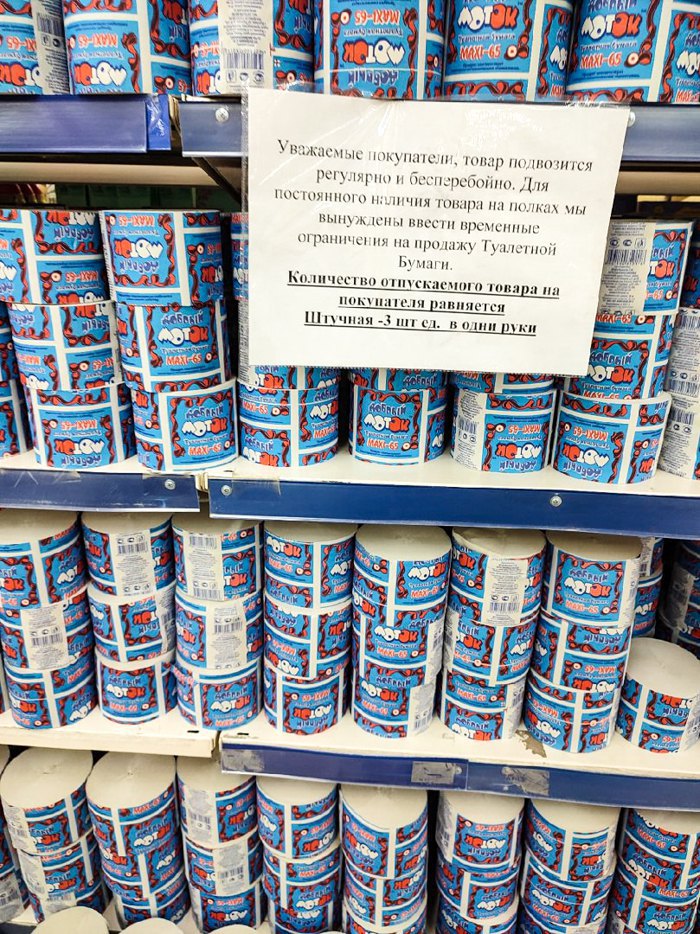
The situation is much worse with office paper. It is almost impossible to find standard A4 paper in the stores. And the price has increased ten times. Before 24 February 2022, the lowest price was 200 rubles (70 hryvnias); now, the lowest price is two thousand rubles (about 700 hryvnias).
The story is the same with hygiene products. Conventional antiperspirants of well-known brands are still on the market. "Gillette" costs about 530-580 rubles (185 hryvnias), "Old Spice" - 400 rubles (140 hryvnias), "Rexona" - 200 rubles (70 hryvnias).
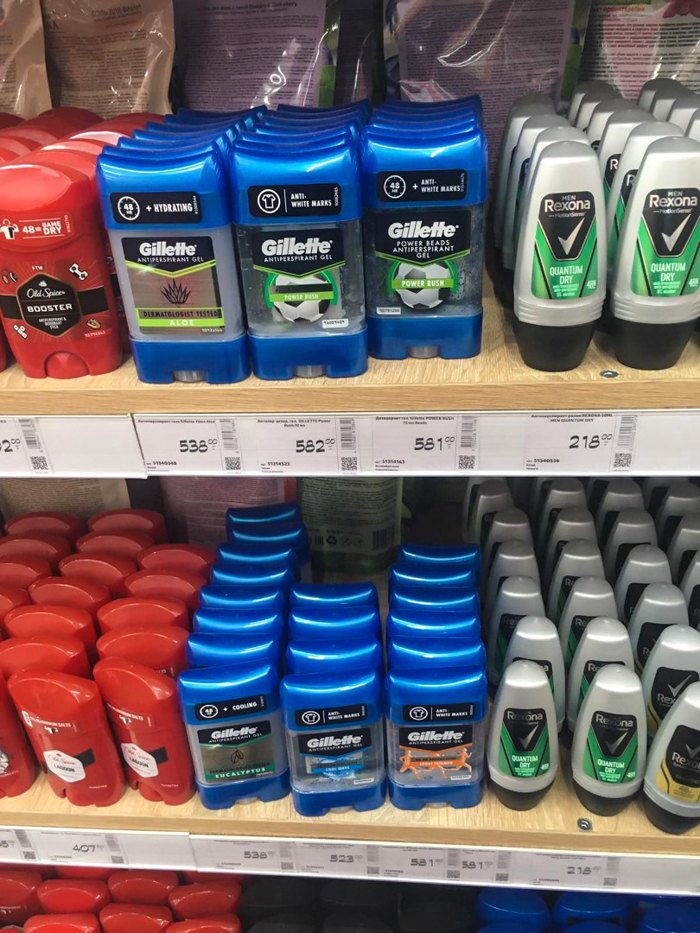
While preparing this article, the price of feminine hygiene products was 542 rubles per pack (188 hryvnias). However, one can find some for 350 rubles (121 hryvnias). It is difficult to buy baby diapers because of the limited supply and because the price has increased two times. In particular, the cost of Dada and Helen Harper diapers increased from 700 rubles (288 hryvnias)
to 1300 (536 hryvnias) per pack.
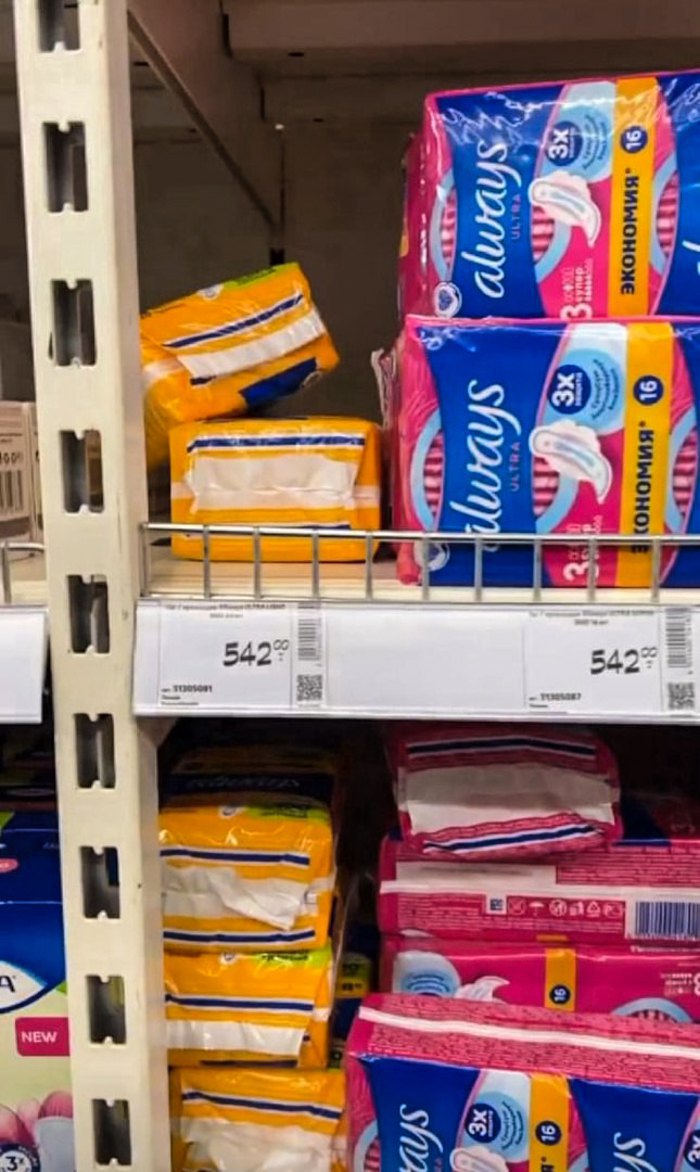
The residents of CADRL also complain that the price of soap has increased: a simple bar costs 150-200 rubles (70 hryvnias).
Until 24 February 2022, the average price of budget-oriented models of smartphones Xiaomi, Huawei, and Oppo was 14 thousand rubles (five thousand hryvnias); now, it reaches 22 thousand rubles (about 8.5 thousand hryvnias).
In addition, rent prices have also increased significantly. For example, the average price per month "in a safe district of Donetsk" is 15 thousand rubles (6.2 thousand hryvnias), but you have to pay the same amount as a deposit and for the services of a realtor. So to rent a one-room apartment, one should prepare 45 thousand rubles (18.5 thousand hryvnias). On the other hand, in Makiivka, Horlivka, or Khartsyzsk, the rent price is lower - 10 thousand rubles per month (4 thousand hryvnias). And realtors take not 100% of the monthly rent but only 50%. Therefore, the initial payment is reduced to 25 thousand rubles (10 thousand hryvnias).
What the residents of "republics" like the least is that hryvnia is back, more precisely its new local exchange rate and the possibility to use it.
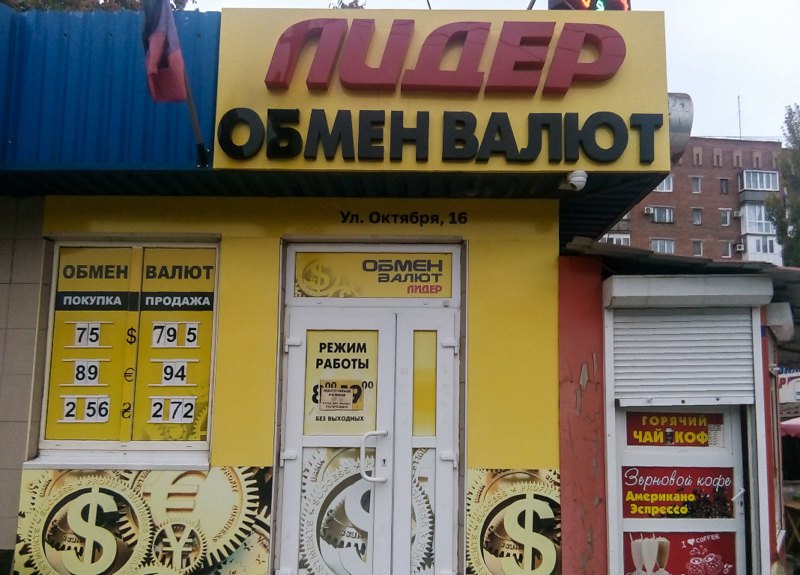
Since implementing the ruble zone in CADRL, hryvnias' exchange rate has been two to one. However, right before the full-scale invasion, the so-called "LPR / DPR" banks began to accumulate hryvnias and offered a new "attractive" rate - 2.5 rubles per hryvnia. As residents told LB.ua, the occupiers needed hryvnias to pay salaries to people from the part of Donbas that was unoccupied until 24 February 2022.
After 24 February 2022, the leaders of the so-called "DPR" and "LPR" signed decrees on "temporary" payments in hryvnias until July of the current year. Naturally, this made the locals angry, as only so-called "refugees," people who voluntarily moved or, in most cases, were deported from destroyed Volnovakha and Mariupol, can pay in hryvnias. They have to show their Ukrainian passport or driving license to do so. Sometimes, however, their word is taken as a proof.
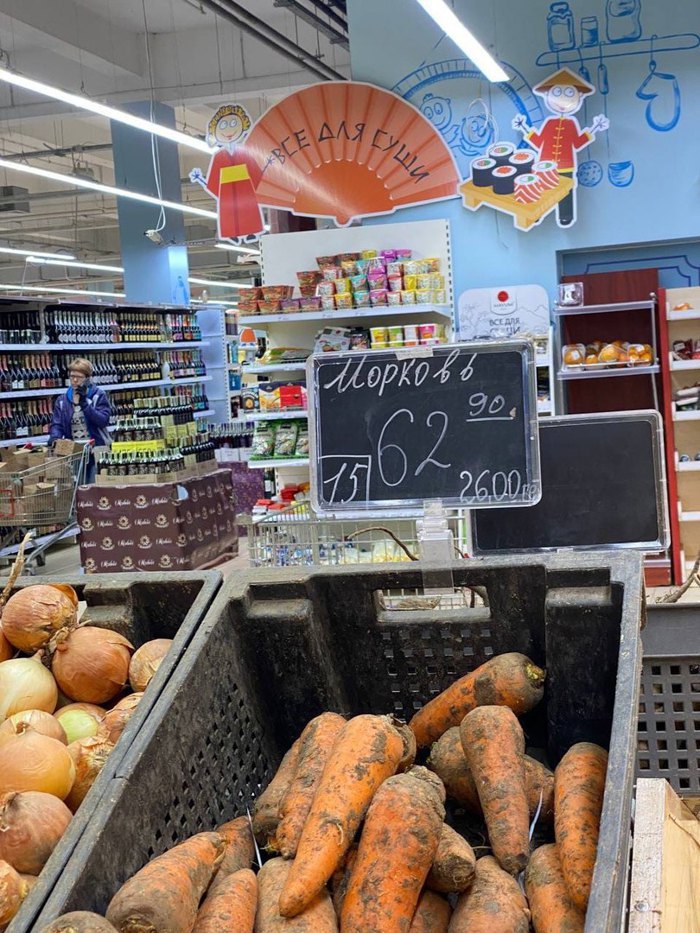
The prices in the supermarkets are given in rubles and hryvnias, and some goods are cheaper in hryvnias and some in rubles. People complain that they do not understand how the prices are formed.
Shop assistants and owners of some stores refuse to accept hryvnias. It complicates the lives of Ukrainians, who were deported to the occupied territory.
One can exchange hryvnias for rubles only in the so-called "republican bank." However, there are long queues there. Moreover, it is almost impossible to find exchangers as they are hiding from the so-called "mobilization."
In the occupied part of the Donetsk region, locals believe that the authorities of the "republic" led by Denys Pushylin get profits based on the exchange rate.
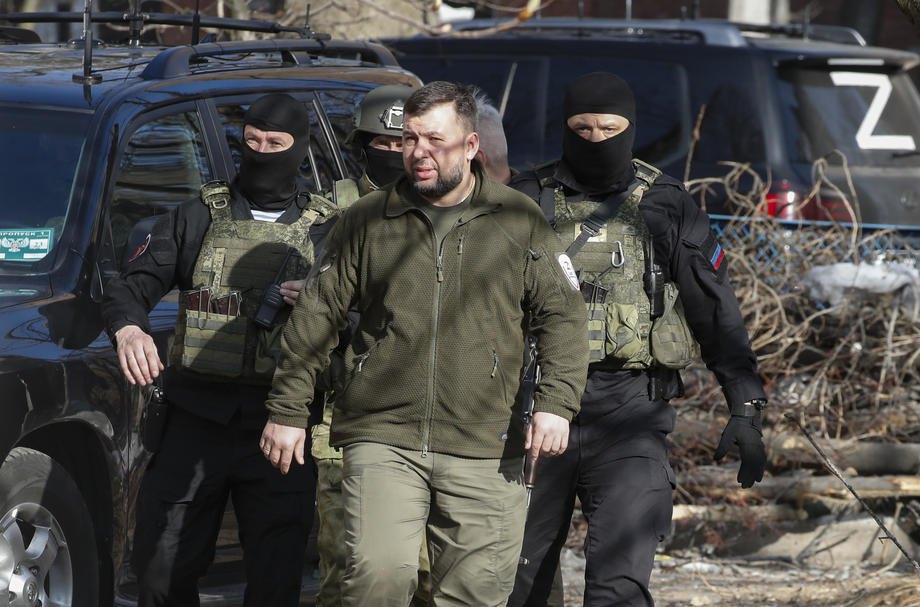
"Refugees"
We have yet to find out about the full scale of Donbas frontline cities residents' deportation.
People are being taken to Russia and the CADRL cities. The residents of the "republics" are not very happy with the "refugees." The "refugees" are settled in community centers, schools, and kindergartens.
The representatives of occupation administrations force the employees of factories, mines, and public sector enterprises to donate money for humanitarian aid for "refugees." The locals must bring blankets, clothes, food, hygiene products, and medicines. All these things must be new, purchased at their own expense. The residents of the "republics" are outraged because they do not have enough money to buy food and clothing for themselves.
What the locals dislike the most is the political position of deported people. "Refugees" often speak openly about their political position and even hang Ukrainian flags on the schools where they were settled.
"Around 21-22 March 2022, they brought people from Mariupol to Makiivka; they were settled in schools №4, №11, and №22. People did not want to go to Makiivka or Donetsk. As people told me, about 90 percent of them were looking for buses to Zaporizhzhia. And these "liberators" stole buses brought from Ukraine, and the word "Zaporizhzhya" was written there. People entered those buses and were brought to Makiivka. They began to resent. Those settled in school №22, which is in the center of the city, hung the flag of Ukraine at night and wrote with a spray paint "Glory to Ukraine" at the entrance to the school. People could not wipe the phrase out for several days. Because of this, they were denied mattresses. People do not want to go to the DPR because there are no prospects here," a resident of Makiivka told LB.ua.
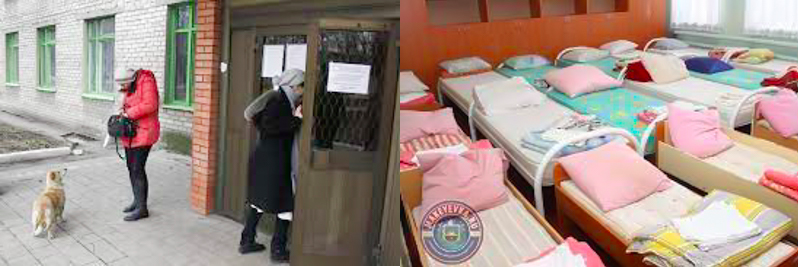
At the same time, russian and local propagandists are trying to make stories about "residents of Donbas saved from the Nazis." For example, after bombing the maternity hospital in Mariupol, the russain occupiers deported Mariupol resident Mariana Vyshemerska, whose photo was published by all news agencies worldwide, to Makiivka. There, the propagandists "interviewed" her and released the information that there was no bombing and it all was fake. However, the russian military leadership first confirmed the bombing and justified it by saying that "Azov" Regiment worriers were allegedly hiding in the maternity hospital.
"Mobilization" and KIA
The most critical life problem in CADRL is the so-called "mobilization ." Now, it is very difficult to meet men in the streets of the cities of the occupied Donbas. Some intercity and city bus routes do not function; it is impossible to call a taxi.
The business of transferring money to the unoccupied territory and exchanging Ukrainian retirement benefits through Internet banking has almost completely stopped. All these things were done in most cases by men. Now they stay at home or in country houses or friends' apartments to avoid military mobilization and participation in the war.
Schools lack teachers of physical education and arts and crafts. As a result, social networks are full of messages from unhappy parents: physical education classes are being canceled, and boys are forced to cook and knit scarves during arts and crafts classes.
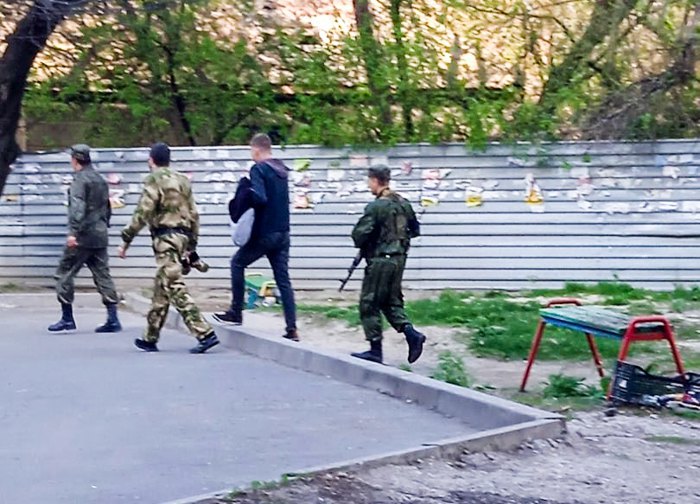
There are not enough men in factories, mines, and among the personnel of the State Emergency Service. The occupation administrations also acknowledged this. As a result, some critical infrastructure employees have been given so-called "mobilization protection" [it means they cannot be forced to join the army]. However, nobody knows how long it will last. Meanwhile, the mobilization age has been raised to 65 years.
Schools and kindergartens employees are involved in the search for mobilization resources. "A kindergarten teacher called me today and asked if my husband had been mobilized. She said it was just a formality," - said Natalia, a resident of occupied Donetsk.
Sometimes, they say that the apartment building is mined, and when everyone gets outside, they deliver conscription notices to men.
In the Luhansk region, the occupiers block the streets with military vehicles and police vans and catch men.
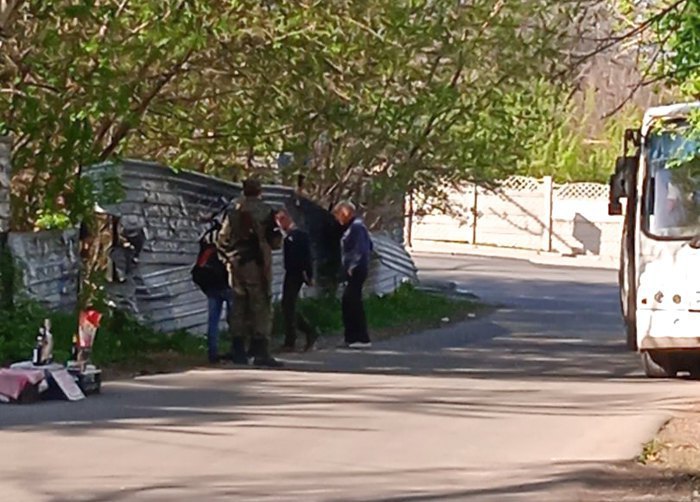
Women who have at least some medical training are also mobilized to join the First and Second Army Corps. LB.ua found out that sanitary service employees join the army as military paramedics. For example, almost all female laboratory employees of one of the sanitation centers in Donetsk aged 18 to 45 were mobilized.
In the universities of occupied Donetsk, those who will join the army are promised to get spring exams results automatically. Students are waiting for the exams with fear; they are worried that they may be forced to participate in war when the exam are over.
Even those who do not support russia and the so-called "LPR / DPR" are being mobilized.
"My son never supported "DPR." In 2014, he even was illegally arrested for some time because of his pro-Ukrainian position. Now he has been mobilized; they sent him to the front without any training. He was first sent to the Volnovakha area, then to Melitopol. They do not get food there; during all this time they only once received a pack of instant mashed potatoes for three people. He would like to surrender, but they are being threatened that if they do so, a sniper will shoot them," - a resident of occupied Makiivka told LB.ua. She added that the financial support of her son's military unit is very poor; many [soldiers] do not even have bulletproof vests.
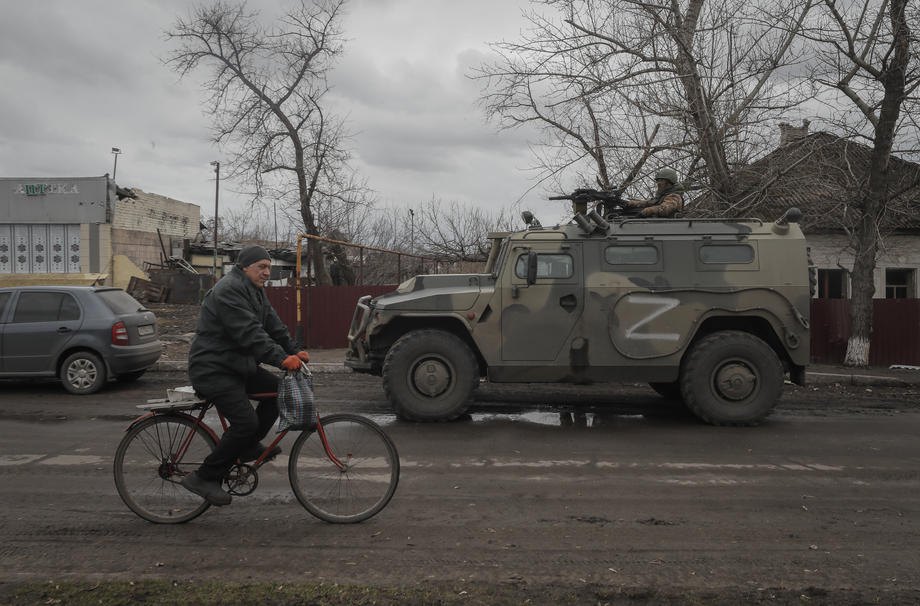
It is almost impossible to get at least some monetary compensation for a killed husband or son in the occupied territories. The salaries of the "mobilized" are not paid either. However, if those had any business before the conscription, their families must continue to pay taxes, place rent, etc.
Even the wounded do not get assistance.
"WIA guys are paying for their treatment. There is no money in our hospitals. How are they going to pay the promised millions? "Refugees" who yell "Glory to Ukraine" receive 10 thousand, and our guys - nothing. And the mothers and wives, whose breadwinners were taken to the front, sit with their children and eat the last slice of bread," - a resident of the occupied Donbas wrote anonymously in the public group "Life in DPR."
In general, "mobilization" is the most discussed topic on social networks in CADRL; the residents of the territories do not want to go to war.
The "mobilized" are suffering huge losses - both the MID (Main Intelligence Directorate) and the Ukrainian military confirm this fact. In mid-April, information about this started to reach the residents of CADRL. Those who managed to survive tell the residents about the current situation. For example, a resident of Donetsk anonymously told LB.ua that her brother was "lost" near Mariupol.
"My brother was mobilized at the end of March, and we did not hear from him for a while. Then he got in touch on 23 April 2022. Only five of his unit survived, and all others died. They were left in a village near Mariupol. Everybody just forgot about them; they don't even know where to go now. The locals allowed them to call their families; now they are hiding in a damaged house; they have no food and water," - she said.
Relatives of the "mobilized" received the first "killed in action" notice. After that, however, apart from sheets of paper, the relatives receive nothing, sometimes even the bodies of their relatives.
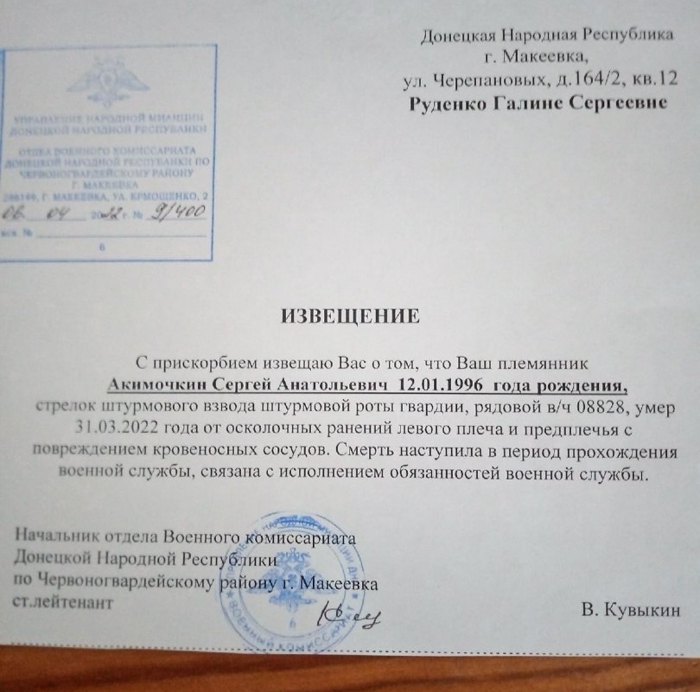
"My nephew Serhiy Akimochkin, born in 1996, died on the battlefield near Mariupol. He served in "Somali." There are no relatives except his grandmother and muself. I buried him in the family cemetery. I want to get some payments, but they keep sending me away from everywhere. I do not even have the opportunity to pay for a gravestone for the child. What did the boy die for?" - wrote one woman in the group "Life in the DPR" of the network "VKontakte."
Another resident of CADRL, Anna Shepetko, posted a photo of her brother who died in the port of Mariupol on her "Vkontakte" page. She said that the entire crew of his tank was killed, but she could not find the bodies.
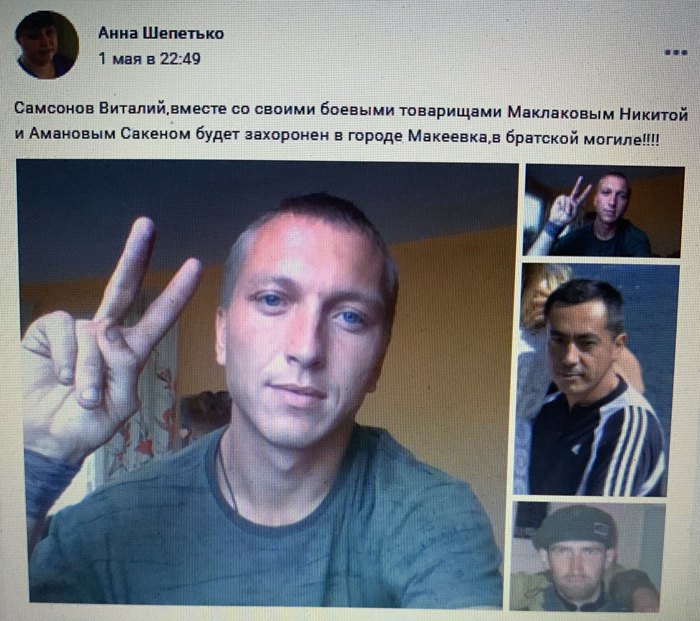
In another post, Anna Shepetko noted that her brother would be buried in Makiivka in a mass grave.
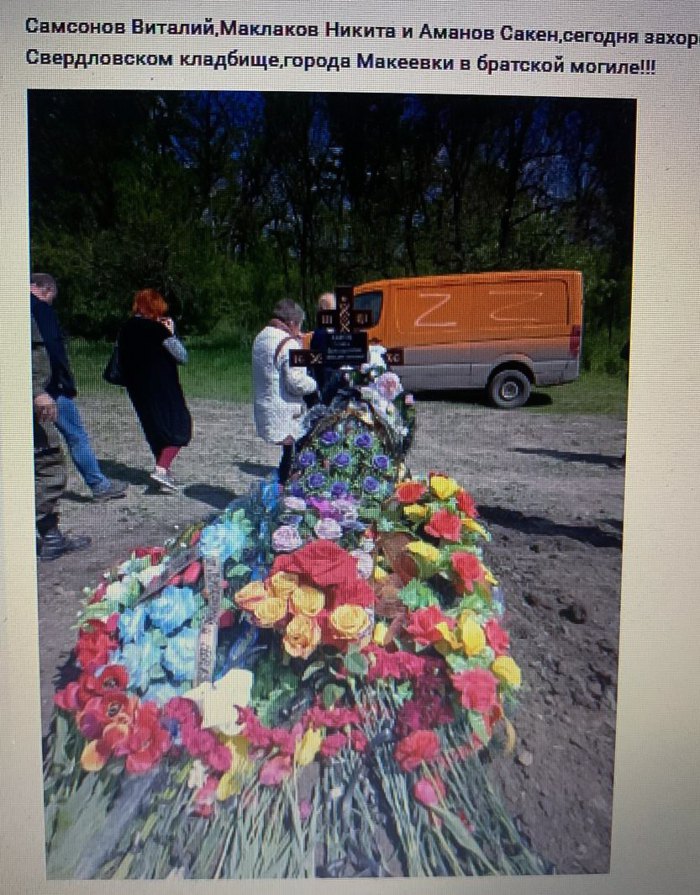
Those bodies that are finally released to be taken by the relatives have been lying in the CADRL morgues for about a month. Locals say that a large number of corpses have been lying on the territory of the Hospital n.a M.I. Kalinin since 26 March 2022. Some are kept just in military tents.
"Our son was taken on 2 March 2022. We talked to him on 15 March 2022; they were sent to assault Marinka. After that, there was no news from him. We received a call on 22 April 2022, and we were told to come to the Hospital n.a M.I. Kalinin. They brought us 50 bags with corpses from the tent and told us: "Look for your son." His body was not in those bags. Thanks to his documents, my grandmother and I found my son in one of the tents, as it was impossible to recognize him. The bodies are kept there for about a month. This is done in order not to pay compensation. Because those who are not recognized are considered missing, and no one will pay their relatives," - a Donetsk resident told LB.ua.
Those who received compensation were given only 10 thousand rubles (4 thousand hryvnias) for the dead relatives.








